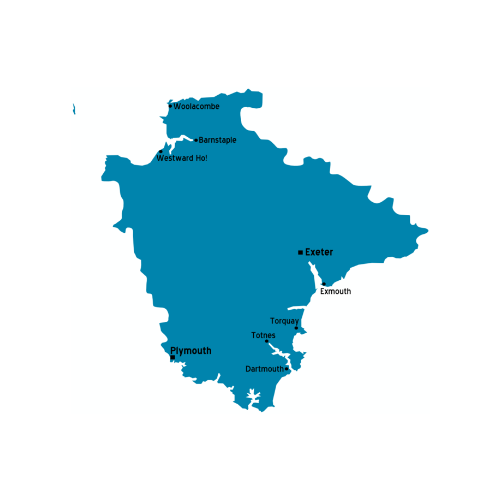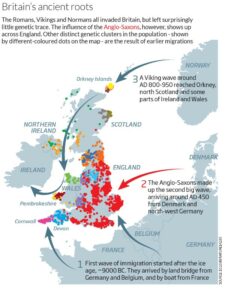Devon took its name from the county’s original Iron Age inhabitants, the Dumnonii ‘Celts’. This was the tribe whose homeland was Dumnonia, the area covered by present-day Devon and Cornwall, along with parts of Dorset and Somerset. They lived in Torbay from at least the Iron Age up to the early Saxon period.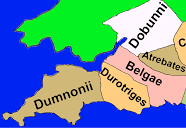
For the sophisticated folks of Greece and Rome the Britons were a strange barbaric people on the fringe of the Empire. The early third century Roman Solinus, author of ‘De mirabilibus mundi’ (‘The Wonders of the World’) called us the ‘Dunmonii’, while Ptolemy (cAD 100-c170) from Alexandria called us the ‘Damnonii’.
As forte meaning of the name, in 1607 the antiquarian William Camden suggested that Dumnonii came from ‘dumno’, meaning “the deep” or “the earth”. Hence, Devonians are, “the deep valley dwellers”. You may want to take this with a pinch of salt though.
Over time there was a shift from M to V in the Celtic language, so we get something like Duvnonia, which is getting closer to ‘Devon’.
During the eighth and ninth centuries the Anglo-Saxon settlement of Britain partly assimilated the Devon part of Dumnonia into the Kingdom of Wessex. The western boundary with Cornwall was fixed at the River Tamar by King Æthelstan in 936, dividing up the ancestral land.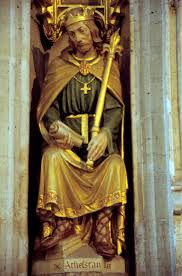
Anglo-Saxon texts from before 1000 AD refer to ‘Defenascire’, the ‘Shire of the Devonians’. A shire is a term for a division of land used in Wessex from the beginning of the Anglo-Saxon settlement, so it looks like the appellation may date to that eighth century occupation. Shires then spread to most of the rest of England in the tenth century. As shires derive from the Old English sćir, and from the Germanic skizo, referring to a district under a governor, this was an imposition on the old country. It would later become synonymous with county which is a Norman administrative unit. More than half of England has the ‘shire’ suffix and, intriguingly, the counties that don’t are mainly in three areas: the south-east, far north and south-west of England.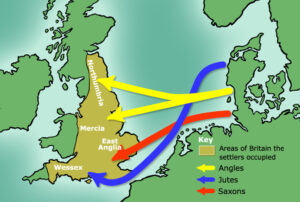
Devon, therefore, is only part of a territory that was once a much larger Celtic ‘nation’, known in Latin as Dumnonia before it became the Anglo-Saxon province of Defenascire – or Devonshire – which eventually would become part of England.
Recognising this evolution, in 1607 the antiquarian William Camden (pictured) in his Britannia, described Devon and Cornwall: “The Country of this nation is at this day divided into two parts, known by later names of Cornwall and Denshire; by the English Saxons it is known as ‘Deven-schire’, whereof grew the Latin name ‘Devonia’, and by that contraction which the vulgar people useth, ‘Denshire’.”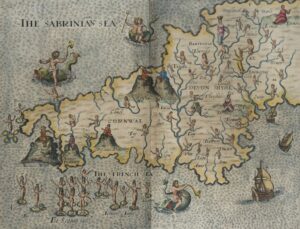
Hence, the term Devonshire was widely used in the past. Old maps such as the 1601 ‘Map of Cornwal and Devonshyre’ from Poly-Olbion (pictured) and the 1626 edition of Britannia referred to Devonshire; while the 1868 National Gazetteer describes the South West counties, all with the same postfix,“Devonshire, a maritime county in the SW of England, bounded on the N and NW by the Bristol Channel, on the NE by Somersetshire, on the E by Dorsetshire”. 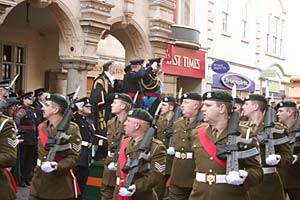
Since local government reorganisation in the 1970s, the term Devon is now the norm – as in Devon County Council. Devonshire, on the other hand, continues to be used by The Devonshire Association. The other reminder of the past is the Devonshire and Dorset Regiment which was formed in 1958 by the amalgamation of the regiments of those two counties. The final parade of the Devonshire and Dorset Regiment was held in Exeter in 2007.
So, referring to Devon or Devonshire is largely down to personal taste, although there is another way of looking at it.
It was originally thought that when the Anglo-Saxons invaded they either killed all the ‘Celts’ or forced them to flee to Cornwall or Brittany. However, in 2015 groundbreaking research found that, remarkably, some Devon folk still retain a Celtic presence in our DNA – 1,500 years after the arrival of the Anglo-Saxons.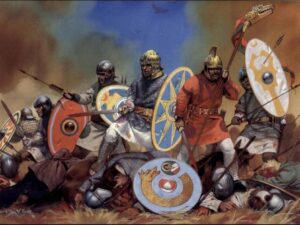
It looks like the Dumnonii Britons survived the invasion. In this UK wide genetic test it was discovered that there are separate genetic groups in Cornwall and Devon to the rest of Southern England, suggesting that the Anglo-Saxon migration into Devon was limited rather than a mass movement of exterminating Saxons. Indeed, it was recorded that a Celtic language was still being spoken in the South Hams in the Middle Ages
So, if you are one of those Dumnonian Celts still quietly resisting the Anglo-Saxon occupation, do proudly proclaim that we live in the ancient kingdom of Devon; and not merely an administrative unit of Johnny-come-lately Germanics.
 You can join us on our social media pages, follow us on Facebook or Twitter and keep up to date with whats going on in South Devon.
You can join us on our social media pages, follow us on Facebook or Twitter and keep up to date with whats going on in South Devon. Got a news story, blog or press release that you’d like to share or want to advertise with us? Contact us


